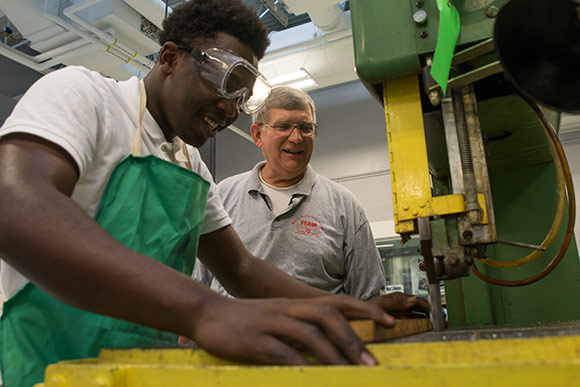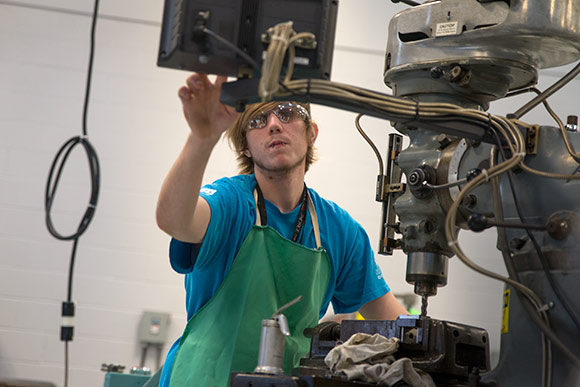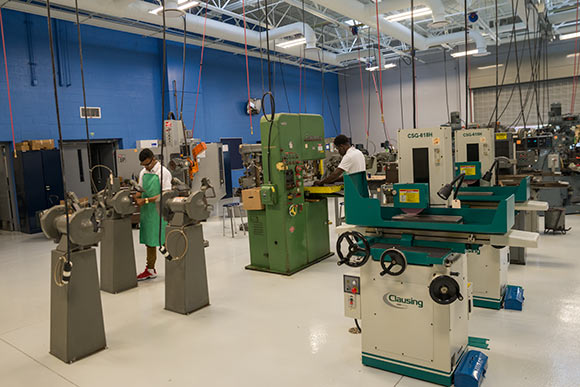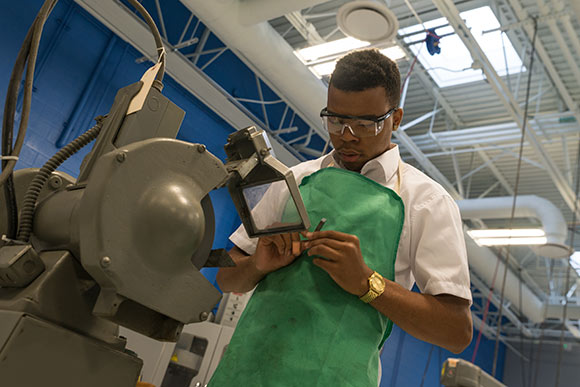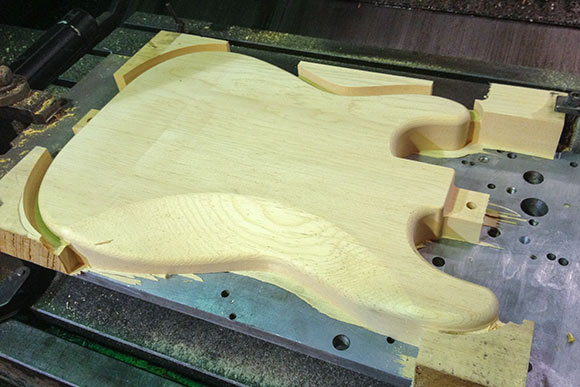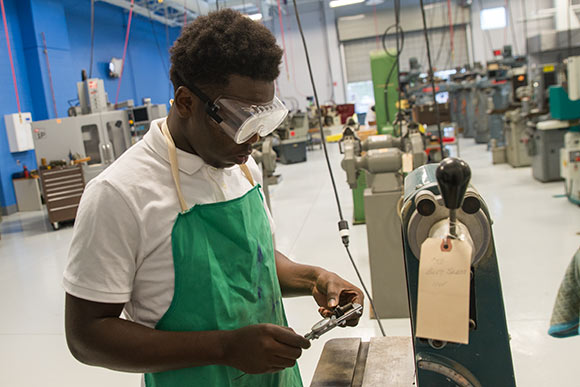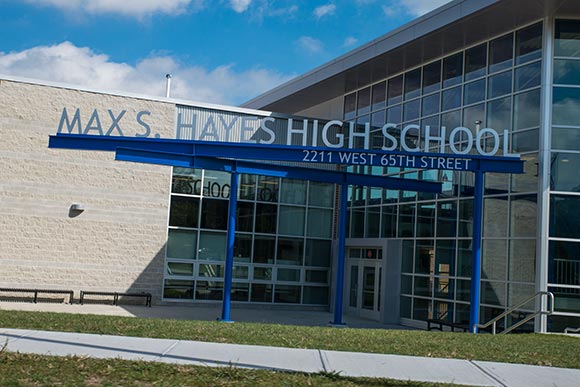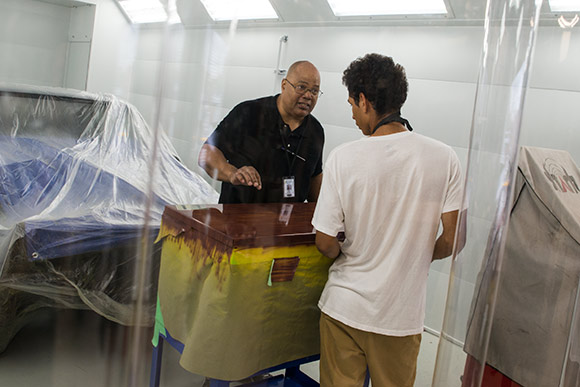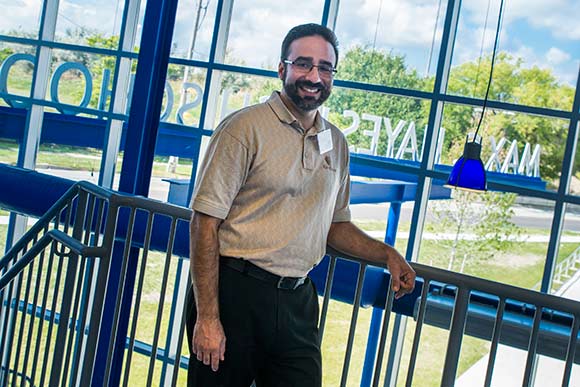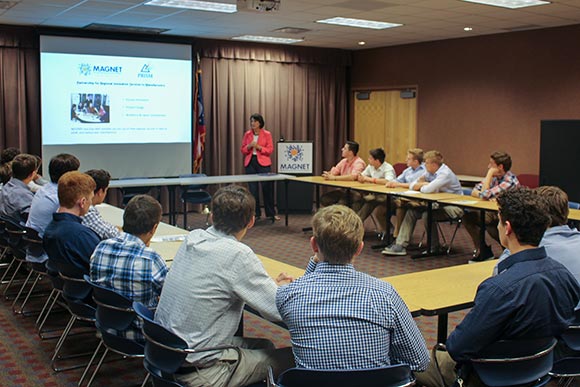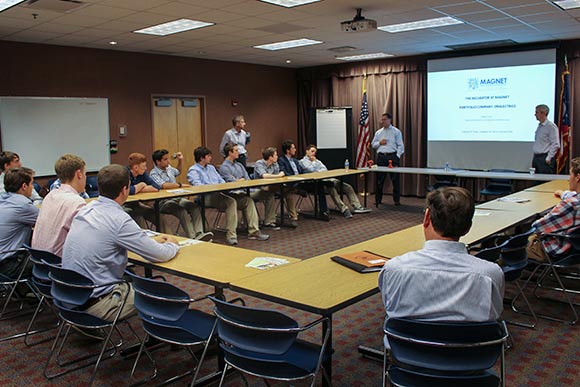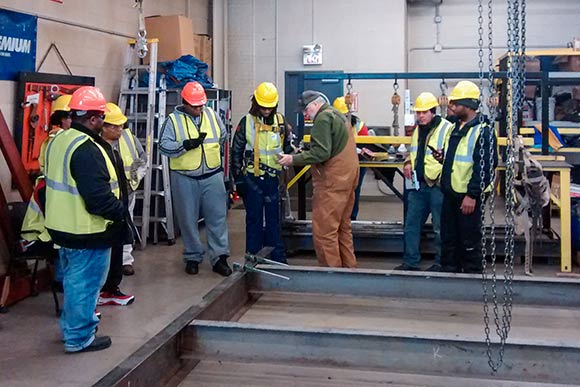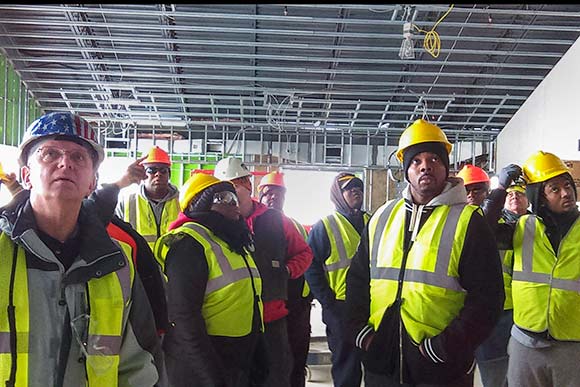Area groups strive to produce the next generation of skilled laborers
Shop class has all but disappeared from the American high-school curriculum, a trend that began in the 1970s when conventional wisdom pointed to a four-year degree as the purest pathway to success.
A generation that hasn't been taught to use tools has left a widening hole in the country's trade industries, observers say. According to the 2011 Skills Gap Survey by the Manufacturing Institute, about 600,000 manufacturing jobs are unfilled nationally due to a lack of qualified workers.
Northeast Ohio has undergone a similar trend, with industrial- or shop-based education being steadily supplanted by the science, technology, engineering and math (STEM) offerings thought to be the savior of the region. However, local efforts to produce the next generation of skilled laborers remain via apprenticeships, vocational schools and support organizations. Backers believe continued labors in these areas will plug the talent gap with young workers wanting an alternative from the traditional college track.
"Keeping our workforce strong and diverse means reaching younger audiences," says José Estremera, director of youth programs at Wire-Net, an economic nonprofit serving Cleveland's manufacturing space.
Learning a new life
After graduating from Glenville High School in 2009, Perez Brown had to figure out what to do with his life. As a young father of two, Brown has cleaned floors at the Cleveland Clinic and headed a staff of 12 at a dollar store in Cleveland, winning a Manager of the Year award for his leadership abilities.
Despite the accolades, Brown wanted to learn a trade. That's when he found Cuyahoga Community College's construction pre-apprenticeship program (PAT). The eight-week course provides skilled-trade instruction via a curriculum developed by the building and construction trades department of the AFL-CIO.
Through the program, part of the Tri-C Workforce Community Economic Development Division (WCED), Brown learned to read blueprints and received training with various tools. As one of 49 students to complete the class since its inception in January 2014, the East Cleveland resident entered the workforce as a cement mason apprentice. Brown trained for an additional eight weeks with the Cement Masons Local 404 before his hire by Donley Construction, a provider of concrete systems.
"I'm on Donley's payroll and doing work through my union," says Brown, 24. "The industry is booming."
Brown has worked on several high-profile projects, including the under-construction Hilton Cleveland Downtown. Though currently in training, he is already looking ahead to a future as a foreman or other construction management position.
"Tri-C gave me the experience and education to pursue my career," says Brown. "They opened a door in life for me."

Over 70 percent of program participants have been placed in building trades, notes Starr Sherman, project coordinator for Tri-C's Advanced Technology Training Center.
Part of the course's success can be ascribed to support from the City of Cleveland and the Greater Cleveland Partnership, says Sherman. Area property developers and contractors seeking to build a locally-sourced pipeline of talent into the construction industry are also on board.
"Our intention is to place students on projects as first-year apprenticeships," Sherman says. "Once accepted into a union program we always encourage those students to continue their education and pursue their specific trade concentration."
Sherman visits high school and adult job fairs to expose recruits to work within the industry. Those opportunities will continue to grow as Tri-C expands its programming to better incorporate minorities and women, she says.
"Given the three to five year training process (from pre-apprentice to journeyman), continued action is needed to ensure the talent pipeline is available," says Sherman.
A well-rounded labor force
If the employees of tomorrow are the students of today, then forging relationships with industry-related businesses and organizations will keep potential construction workers, electricians, and carpenters on the forefront of manufacturing trends and practices, says Wire-Net's Estremera.
One of the Cleveland-area manufacturing advocacy group's most resilient partners is Max S. Hayes High School, which offers training options for a variety of high-skilled trades including construction and welding.
Wire-Net has been linked with Max Hayes for 22 years, a connection officials say has strengthened considerably during the school's redesign process as part of an across-the-board revitalization of the Cleveland Metropolitan School District (CMSD).
Wire-Net organized a technical team to assist Max Hayes in a curriculum enhancement effort that integrates project-based experiences with classroom learning. Students take plant tours and engage in development workshops with such partner corporations as Jergens and Panzica Construction.
During the 2014-15 school year, Wire-Net placed 60 Max Hayes students in paid internships, where they helped project managers conduct site assessments or got their hands dirty repairing engines. Simply being on site allowed students to hone their problem-solving, networking and communication skills, notes Estremera.
"The industry is asking for higher-level skills than what students are traditionally exposed to," he says. "Employers want a workforce with soft skills as well as technical skills."
A well-rounded labor force is needed for increasingly robust local industries like additive manufacturing, Estremera maintains. To keep the momentum going, Wire-Net recently formed Friends of Max Hayes, a governing group designed to prepare graduates for a globally competitive market.
 Max Hayes student playing the 1963 Fender Stratocaster made in the machine shop
Max Hayes student playing the 1963 Fender Stratocaster made in the machine shop
"Students are taking what they learn into the field," says Estremera. "A direct link to a job gives them a chance to decide if this career is for them."
Some jobs are more unusual than others, says Max Hayes instructor Anthony Kazel, a 40-year veteran of the school's machine shop. Last spring, Kazel taught a precision machine technology course on guitar building, where students used a CNC router to cut out the body of the instrument.
The class built one guitar - designed after a 1963 Fender Stratocaster - and finished custom-made parts for another. Overseeing a project from design to construction can prepare students for a potentially lucrative manufacturing career, whether it's in the music industry or not.
"Our kids come here as hands-on learners," Kazel says. "If we don't refine those basic skills, they may not get them anywhere else."
A higher-tech calling
While traditional manufacturing remains an option, tech fields like mechatronics represent a "cleaner" path for students averse to the more down 'n dirty aspects of manufacturing, says Judith Crocker, executive director of workforce and talent development at MAGNET. The economic development group is aligned with area colleges in providing employers highly qualified interns with skills in engineering, design and IT.
"We're trying to get students into those career paths, and we know manufacturers still need accountants and marketers," says Crocker. "Someone with a business inclination could work with a company like Lubrizol on a marketing campaign."
Career technical programming related to advanced manufacturing is also on the rise regionally, Crocker says. For example, ArcelorMittal brought its Steelworker for the Future program to Cleveland in 2012 in partnership with Tri-C and Lakeland Community College. The company hired four program graduates last fall, placing them into entry-level mechanical and electrical craftsmen positions that focus on maintaining high-end service equipment.
"Every company doing manufacturing is going to need maintenance help," says Crocker.
MAGNET has seen a resurgence of tech manufacturing opportunities regionwide, with schools and career centers highlighting at least some of the skills demanded by a new economy. Filling the talent gap on all levels of the industry can be a boon both for Northeast Ohio and an energetic young workforce in search of lasting employment.
"We have a manufacturing sector that's aging," says Crocker. "If we don't get students thinking about these jobs now, they'll graduate without these opportunities."


